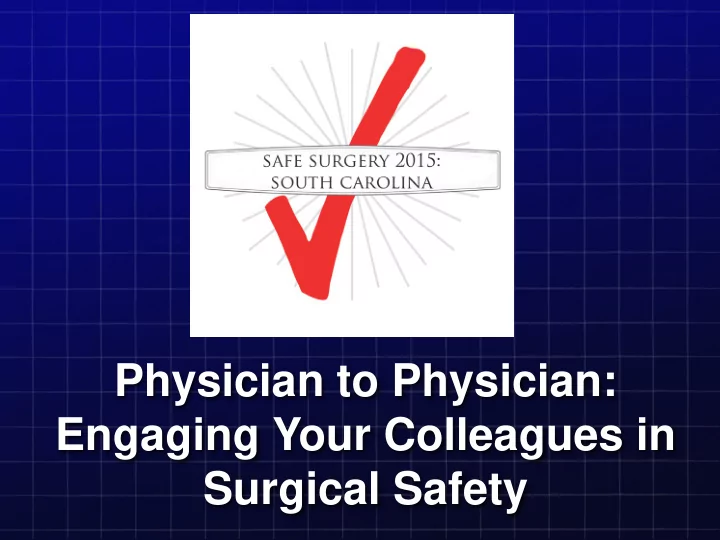

Physician to Physician: Engaging Your Colleagues in Surgical Safety
Today’s Topics • Engaging your colleagues with a one-on-one conversation • A presentation for physicians
The One-on-One Conversation
Methods of Engagement • Posters • Bulletin Boards • Large Meetings • Departmental Meetings • Emails • Hospital Newsletters • One-on-One Conversations
Nothing Replaces this Conversation • Staff meetings don ’ t count. • Emails don ’ t count. • Posters don ’ t count. • Bulletin boards don ’ t count.
Framing Your Conversation With A Colleague • Schedule a time to meet with them. • Make sure that you have a copy of your hospital’s checklist. • Highlight the items on the checklist that you would like the physician to lead. • Introduce the checklist as a teamwork and communication tool.
A Presentation for Physicians
Physicians “Competitiveness, self-confidence, expectation for success, ability to regulate stress, practice a lot, stay focused, block out distracting stimuli, rehearse their task mentally beforehand, follow their own plans, are not flustered by unexpected events, learn from mistakes and never give up” – [Shermer, 2005]
What Is Missing? • Teamwork • Leadership
We Think Things Are Pretty Good . . . Makary et al., J Am Coll Surg 2006; 202: 746-52
Not Everyone Agrees Makary et al., J Am Coll Surg 2006; 202: 746-52
Haynes et al. A Surgical Safety Checklist to Reduce Morbidity and Mortality in a Global Population. New England Journal of Medicine. 2009 Jan 29; 360(5):491-9.
Evidence “Driven” Behavior
Believing
The “Scrub Sink Trance” & The Joint Commission Timeout
The Joint Commission Time Out Is A Gift
What You Might Hear From Your Colleague • “I am stressed.” • “I need to stay focused.” • “It’s time to do the CHECKLIST” • “I don’t want to do it – I never did this before – it makes me feel weird.” • “I am already safe - I don’t need to do it.” • “My team knows what I want without me asking.” • “Maybe the surgeon in the next room needs it.”
I Need Your Help
Physician Acceptance is the Critical Factor in Successful and Meaningful Use of the Checklist
How We Act Matters • The team is looking to you for leadership. • You are setting the tone for the rest of the operation. • Others will follow your patterns of communication. • This is an opportunity to make your plan clear, answer questions, demonstrate openness and professionalism.
What Can You Do? • Activate people by using their names. • Set the Tone – Make everyone feel “safe”. • Tell the team what you are going to do before you start. • Encourage team members to speak up. • Stop to Debrief at the end of the case. • Remember to thank your team.
Physicians ARE Leaders • It is our responsibility to work to improve the safety and outcomes of our patients. • We have the power to make change. • We are part of a surgical team and in the position of leading that team – that is a privilege and a responsibility.
This isn’t just about us and what we need . Everyone is in the room for the patient and all of the people around us need our help, encouragement and leadership. Surgery is a team effort and the most effective and safe physicians recognize that.
Resources Website: www.safesurgery2015.org Email: wberry@hsph.harvard.edu
Recommend
More recommend